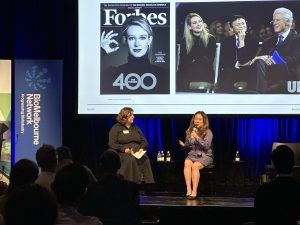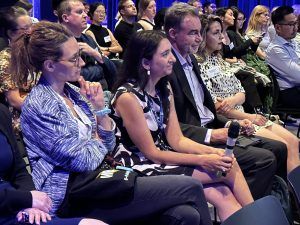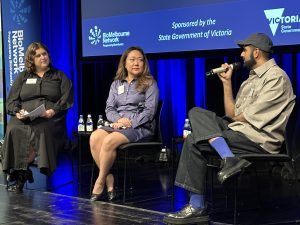
Posted: 27 November 2024
Talent. It’s often said to be the single biggest asset of any company, yet for startups – especially in the healthtech and biotech sectors – attracting, retaining and empowering the right people is one of the toughest challenges they face. How do you set a company up for success when competing with bigger budgets, having limited resources and feeling pressured by the relentless pace of innovation?
These were the core questions explored in a fireside chat hosted by BioMelbourne Network’s CEO, Karen Parr, as part of its “Vital Ventures: Scaling healthtech with sustainable strategies” Masterclass series. Karen’s guests Marissa Senzaki, Talent Director at MDMD and seasoned, internationally experienced talent acquisition strategist and advisor, and Ashwin Ramachandran, award-winning founder and CEO of Melbourne-based Sapyen, shared sharp insights and real-world lessons to help healthtech founders and leaders develop a talent strategy that works.
Supported the Victorian State Government, MDMD and Radium Capital, this session, attended by over 100 guests, was an intimate deep dive into the personal, practical, and the lessons learned.
Marissa Senzaki: Why values drive everything
Marissa Senzaki has spent nearly two decades shaping the talent strategies of companies ranging from fast-growing startups to global giants like Google, Facebook and Slack, where she helped scale the business from 50 employees to 850 in just three years. She is also a “Theranos survivor” having been headhunted by infamous Theranos COO Sunny Balwani and working with Elizabeth Holmes, Theranos CEO. Since this traumatic experience, Marissa’s passion has been creating workplaces where values are more than just words on a website.
Marissa shared with her audience how important company values are and how they define the company and the decision if a potential candidate is the right fit: “Values are not just words that we paint on the wall and then forget about. They need to be found in your people, product and workplace culture.” Drawing from her time at Slack, she explained how the company embedded values like empathy and courtesy into every part of its operations, from recruiting employees to how its product functioned.
One standout example? Slack’s now-famous “shouty rooster” feature – a pop-up notification that warned users they were about to notify team members across time zones, possibly awakening them unnecessarily. Marisa explained that it was both courteous and fun, perfectly encapsulating Slack’s values in action. Salesforce acquired Slack in 2021 for $27.7 billion USD, proving the company’s overall success.
Marissa also shared candid lessons from her time at Theranos, where she was an early talent hire. What seemed to be an exciting and successful career move in the beginning turned into a dreadful experience for her. “The red flags were there,” she said, referring to a lack of transparency, a toxic culture and decisions that didn’t align with her values. After nine months, she had the strength to leave, despite concerns and doubt. Her takeaway for today’s founders? “Never compromise your own values or your employees’ well-being for the sake of ambition. Long-term success is built on integrity.”
Ashwin Ramachandran: Getting talent strategy right early
As the founder of Sapyen, a Melbourne-based startup revolutionising male fertility diagnostics, Ashwin Ramachandran, who works with MDMD and Marisa, understands the pressures startups face. “Every dollar I spend needs to be deployed efficiently and every dollar I spend needs to be at the service of building a product for people that need it,” the recent winner of the prestigious Australian Financial Review BOSS Most innovative Company Award said. For him, talent strategy isn’t just about hiring the best people; it’s about defining the playing field and making sure your team can deliver on your goals.
Ashwin’s company operates with just three full-time employees, yet it has already secured $85 million in contracts with global IVF clinics. How? In part, by building a company culture that serves the company’s ambition to serve the customer, and creates an environment where people feel valued and can exercise their skills without unnecessary barriers. According to the entrepreneur, it’s a culture that instils customer trust. “And to instil trust requires culture from within,” so Ashwin.
He also touched on the importance of having a mix of people in the team and its advisors – those who bring critical thinking and “just enough drag” to slow down rash decisions, alongside those who break through barriers to drive the company forward.
For startups grappling with limited resources, Ashwin’s advice was clear: Get your foundations right early. Fixing culture or talent issues down the line is far more expensive and disruptive.
Why values matter more than ever
One of the recurring themes of the evening was the role of values – not just for founders, but for employees – one of Marisa’s passions: I have a passion for working with early-stage startups and working with founders to make sure that they’re intentional about the culture that they are trying to create, making sure that there’s values alignment between founders and the employees they hire.
“People want their work to be meaningful,” Marissa has observed post-pandemic. “Yes, money and title are still important, but more than ever, the number one thing that people are asking for is meaning in the work they do.” Employees, she says, want to feel that their work aligns with their values and makes a difference.
Marissa shared how she digs deep during interviews to uncover a candidate’s true motivations. “When someone says they’re looking for growth, I always ask, ‘What does growth mean to you?’ It could mean a promotion, a higher salary or simply learning new skills. The answers tell you whether the role you’re offering aligns with their expectations.”
For founders, this means being honest about what your company can and cannot provide. Transparency from the start would prevent misalignment and help build trust.
The challenges of building a dream team
Both speakers acknowledged the difficulties of attracting and retaining top talent in a competitive environment. Startups, in particular, face unique hurdles, from limited budgets to the fast pace of scaling.
Ashwin described the challenge of balancing ambition with the reality of available resources.
Marissa echoed this sentiment, adding that problematic hires can be a significant drain on resources. “Hire slow, fire fast,” she advised. One toxic employee could damage team morale and productivity. It would be better to take the time to find someone who’s the right fit for your culture and values.
Practical lessons for founders
The fireside chat also offered practical takeaways for startups and founders looking to refine their talent strategies:
- Interview for values, not just technical skills. Both speakers emphasised the importance of understanding a candidate’s values and how they align with the company’s mission.
- Create a culture of trust. Whether it’s through transparency, inclusivity or empathy, a strong culture starts with leadership.
- Don’t fear “drag.” As Ashwin explained, a little resistance can be healthy. It ensures that decisions are well-thought-out and aligned with long-term goals.
- Invest in the right people. For startups, it’s not just about hiring “the best” but finding those who can adapt, learn, and grow alongside the company.
A special thanks
This inspiring event was made possible by the support of our partners Victorian State Government, MDMD and Radium Capital, sponsor of the networking event that followed the fireside chat. Their commitment to fostering innovation in the healthtech sector helps make discussions like these possible, equipping startups with the tools and insights they need to succeed.
What’s next?
This fireside chat was just one part of BioMelbourne Network’s ongoing efforts to support the healthtech community. As Karen Parr, BioMelbourne Network’s CEO, noted in closing, “It’s through conversations like these that we drive innovation, build connections, and empower the next generation of leaders in our sector.”
If you have thoughts or feedback about the event, we’d love to hear from you. Your input helps us shape future programming and ensure we’re meeting the needs of our vibrant healthtech ecosystem.






